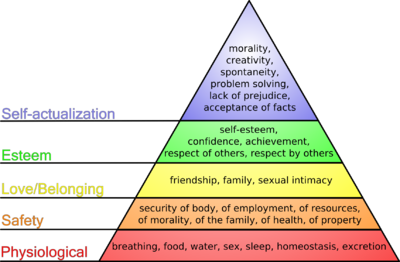David Baxter PhD
Late Founder
Maslow?s Hierarchy of Human Needs
February 19th, 2007
Make Happiness Blog
Maslow?s hierarchy is usually envisioned as a pyramid, with the most basic and most important needs at the bottom of the stack.

As each of our levels of needs are met, we start to worry about the next level of the pyramid. A person who cannot breathe does not spend a lot of effort worrying about self-esteem issues. But, when his physiological needs are met, he does begin to worry about his safety needs.
People at one level of the pyramid often mistakenly believe that they will be happy if only they can get to the next level. Then, when they achieve the next level they are surprised to discover that they are not happy.
One incredibly important key to happiness is to enjoy the process of moving up the pyramid. As each new level is achieved, there will be a temporary rush of joyful celebration ? but it will soon subside as you acclimate to the new level and see the challenges presented by the level still above you.
Achieving stable and lasting happiness requires that you are able to appreciate the progress that you have made and the joy that you will receive at each level of the pyramid which you achieve in the future. The requires a holistic viewpoint of the struggles of your life, an understanding that these struggles are a gift, and an appreciation of the joy that these struggles can bring.
February 19th, 2007
Make Happiness Blog
Maslow?s hierarchy is usually envisioned as a pyramid, with the most basic and most important needs at the bottom of the stack.

As each of our levels of needs are met, we start to worry about the next level of the pyramid. A person who cannot breathe does not spend a lot of effort worrying about self-esteem issues. But, when his physiological needs are met, he does begin to worry about his safety needs.
People at one level of the pyramid often mistakenly believe that they will be happy if only they can get to the next level. Then, when they achieve the next level they are surprised to discover that they are not happy.
One incredibly important key to happiness is to enjoy the process of moving up the pyramid. As each new level is achieved, there will be a temporary rush of joyful celebration ? but it will soon subside as you acclimate to the new level and see the challenges presented by the level still above you.
Achieving stable and lasting happiness requires that you are able to appreciate the progress that you have made and the joy that you will receive at each level of the pyramid which you achieve in the future. The requires a holistic viewpoint of the struggles of your life, an understanding that these struggles are a gift, and an appreciation of the joy that these struggles can bring.
